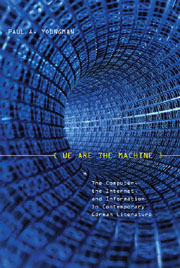Book contents
- Frontmatter
- Contents
- Preface
- Acknowledgments
- Introduction: Machines, Computers, and the Liberal Humanist Subject
- 1 Losing Ground to the Machine: Electronic Brains in the Works of Heinrich Hauser and Friedrich Dürrenmatt
- 2 Fearing the Machine — Two Nightmares in the 1990s: Gerd Heidenreich's New Riddle of the Sphinx and Barbara Frischmuth's Hidden Meaning
- 3 Becoming the Machine: Günter Grass's and Erich Loest's Virtual History, René Pollesch's Postdramatic Imaginings, and “Real” Cyber-Relationships according to Christine Eichel and Daniel Glattauer
- Conclusion: Questions to Ponder
- Bibliography
- Index
Introduction: Machines, Computers, and the Liberal Humanist Subject
Published online by Cambridge University Press: 05 February 2013
- Frontmatter
- Contents
- Preface
- Acknowledgments
- Introduction: Machines, Computers, and the Liberal Humanist Subject
- 1 Losing Ground to the Machine: Electronic Brains in the Works of Heinrich Hauser and Friedrich Dürrenmatt
- 2 Fearing the Machine — Two Nightmares in the 1990s: Gerd Heidenreich's New Riddle of the Sphinx and Barbara Frischmuth's Hidden Meaning
- 3 Becoming the Machine: Günter Grass's and Erich Loest's Virtual History, René Pollesch's Postdramatic Imaginings, and “Real” Cyber-Relationships according to Christine Eichel and Daniel Glattauer
- Conclusion: Questions to Ponder
- Bibliography
- Index
Summary
Many people don't even dare deal with computers because they fear the fathomless depths of information technology.
— Handelsblatt, March 4, 2008THIS BOOK EXAMINES THE LITERARY and cultural reception of information technology (IT), primarily in Germany, but also in Austria and Switzerland, with a focus on the fiction of the late 1990s and the early twenty-first century. The aspect of technological innovation in general that interests me most is its ambivalent reception. There are those who greet new technological developments with alarm and trepidation, there are those who laud each new technology as a nurturer of the growth and development of humankind, and then there is the majority whose opinions and emotions seem to run the entire length of the continuum creating a general sense of unease. IT is the most significant innovation of the twentieth and twenty-first centuries in the German-speaking countries that are the focus of this project, and its reception follows the same pattern. For the purposes of this study, IT includes the hardware and software used in the storage, retrieval, delivery, and manipulation of information, along with its associated networks. What follows is an analysis of the end of the IT reception continuum that runs from concern to outright fear, for it is this apprehension that dominates in the contemporary German fiction in which IT plays a central role.
For historical perspective, I analyze two important works from the beginning of the computer age, Heinrich Hauser's Gigant Hirn (The Giant Brain, 1948) and Friedrich Dürrenmatt's “Elektronische Hirne” (Electronic Brains, 1958), that serve as background for the contemporary issues surrounding IT.
- Type
- Chapter
- Information
- We Are the MachineThe Computer, the Internet, and Information in Contemporary German Literature, pp. 1 - 27Publisher: Boydell & BrewerPrint publication year: 2009



